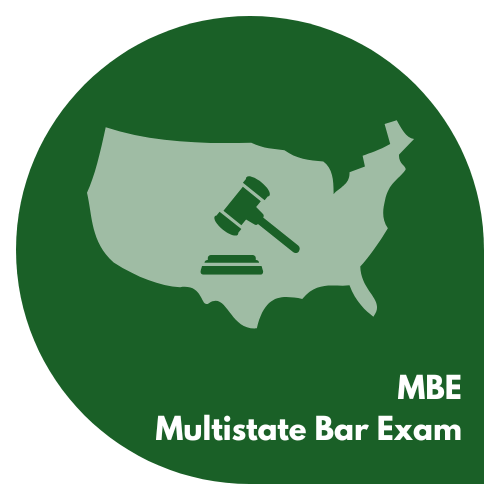Multistate Bar Examination Practice Test
NCBE MBE
Use the form below to configure your Multistate Bar Examination Practice Test. The practice test can be configured to only include certain exam objectives and domains. You can choose between 5-100 questions and set a time limit.

Multistate Bar Examination Information
National Conference of Bar Examiners (NCBE) Multistate Bar Examination (MBE)
The Multistate Bar Examination (MBE) is a standardized test developed by the National Conference of Bar Examiners (NCBE). It is a key component of the bar exam in most U.S. jurisdictions and assesses fundamental legal principles and reasoning skills. The MBE is designed to evaluate a candidate’s ability to apply legal principles and analyze fact patterns across multiple areas of law.
Exam Overview
The MBE consists of 200 multiple-choice questions administered over two three-hour sessions on a single day. Of these, 175 questions are scored, while 25 are unscored pretest questions. The test is divided into two parts: 100 questions in the morning session and 100 in the afternoon. The exam is typically offered twice a year, in February and July. The score required to pass varies by jurisdiction.
Exam Content
The MBE covers seven key areas of law: constitutional law, contracts, criminal law and procedure, evidence, real property, torts, and civil procedure. Constitutional law focuses on governmental powers and individual rights. Contracts assess contract formation, performance, breach, and remedies. Criminal law and procedure cover general principles, specific crimes, and constitutional protections. Evidence tests knowledge of relevance, hearsay, and trial procedures. Real property includes ownership, rights, and transfers. Torts cover liability, negligence, and defenses. Civil procedure examines jurisdiction, pretrial procedures, and trial rules.
Who Should Take This Exam?
The MBE is required for most individuals seeking admission to the bar in the United States. It is typically taken by law school graduates as part of their state’s bar examination process. Some jurisdictions require additional state-specific testing alongside the MBE. Candidates should check with their jurisdiction’s bar admissions office for specific requirements.
How to Prepare
Candidates should review the official NCBE MBE Subject Matter Outline and study materials provided by bar preparation programs. Practice exams can help assess knowledge and improve timing. Many candidates use commercial bar review courses, flashcards, and question banks for additional preparation. Studying legal concepts and practicing under timed conditions can help build test-taking skills.
Summary
The NCBE Multistate Bar Examination (MBE) is a critical component of the bar exam in most U.S. jurisdictions. It assesses core legal knowledge and analytical reasoning across seven areas of law. Proper preparation, including practice exams and bar review courses, is essential for success.